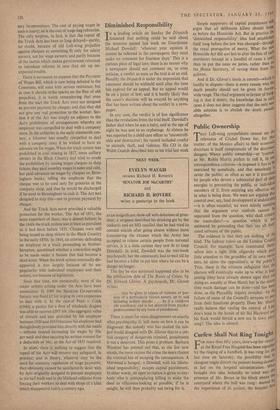Public Ownership
THAT Left-wing sympathisers cannot see the relevance of Crichel Down (or, for that matter, of the Monico affair) to their econornici doctrines is itself symptomatic of the doctrines dangers. Where public ownership—or 'control: as Mr. Robin Marris prefers to call it, in our correspondence columns—is imposed it has to be exercised by somebody, and that soineboclY iS never the public; as often as not it is 'exercised by people who devote a substantial'Parf of theil, energies to preventing the public, or individual members of it, from enjoying any effective saY in what is being done. We were not arguing that control over, say, land development is —it is often essential; we were merely insistini tbat the argument over &Nitro's cannot who'114, separated from the question, who' shall control the controllers?—a question which is noI answered by pretending that theY,are all dedl' cated servants of the public. ' The evidence is that they are nothing of the kind. The Labour rulers on the London;CoultlY Council, for example, have constituted theft)" selves into a tight little oligarchy which pa). little attention to the ,grumbles of its own bers, let alone the opposition's, or the' public S True, there is the ultimate safegbard that 111 electors will eventually wake up to what is flair pening (they have already shown signs they are doing so, notably at West Ham); but in the mean' time much damage can be done---.-and has be done, as the Piccadilly inquiry revealed---sby 111` failure of some of the Council's servants to Per,' form their functions properly. Does Mr. Mara" really believe that vesting the control of L011; don's land in the hands of Sir Ike Hayward and his flock would herald a new era in town plait' ning? The idea is absurd.






































 Previous page
Previous page